Food Source
Food sources refer to the origins of the food we consume. This includes plants, animals, and other sources that provide us with the nutrients and energy needed for survival. Understanding food sources is important for maintaining a balanced and healthy diet.
Types of Food Sources
There are various types of food sources, including:
- Plants: Fruits, vegetables, grains, nuts, and seeds are all examples of plant-based food sources. These foods provide essential vitamins, minerals, and fiber.
- Animals: Meats, dairy products, and eggs are derived from animals and are rich in protein, vitamins, and minerals.
- Seafood: Fish and other seafood are a valuable source of protein, omega-3 fatty acids, and other nutrients.
- Fungi: Mushrooms and other fungi are used as food and provide various nutrients.
- Processed Foods: Foods that have been altered from their original state, such as canned goods, packaged snacks, and ready-to-eat meals.
Importance of Understanding Food Sources
Knowing the sources of our food is crucial for making informed dietary choices. It allows us to:
- Ensure a diverse and balanced diet that provides all essential nutrients.
- Understand the environmental impact of different food sources and make sustainable choices.
- Identify potential allergens or intolerances related to specific food sources.
- Support local and sustainable food production practices.
Study Guide
Here are some key points to understand about food sources:
- Identify and categorize different food sources, including plants, animals, seafood, fungi, and processed foods.
- Understand the nutritional value of various food sources and their contributions to a healthy diet.
- Discuss the environmental impact of different food sources and the importance of sustainable food choices.
- Explore the cultural and geographical significance of various food sources in different regions of the world.
- Examine the role of food labeling and certifications in helping consumers make informed decisions about food sources.
By mastering the concept of food sources, you will gain a deeper understanding of the foods you consume and their impact on your health and the environment.
.◂Science Worksheets and Study Guides Eighth Grade. Organic compounds
Study Guide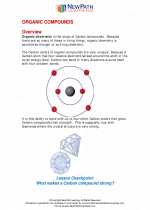 Organic compounds
Organic compounds  Worksheet/Answer key
Worksheet/Answer key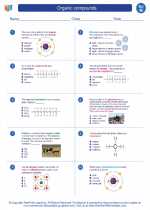 Organic compounds
Organic compounds  Worksheet/Answer key
Worksheet/Answer key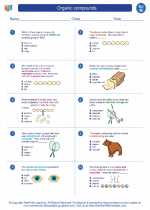 Organic compounds
Organic compounds  Worksheet/Answer key
Worksheet/Answer key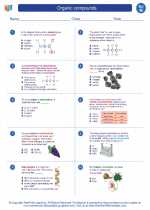 Organic compounds
Organic compounds  Vocabulary/Answer key
Vocabulary/Answer key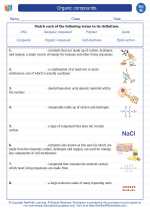 Organic compounds
Organic compounds  Vocabulary/Answer key
Vocabulary/Answer key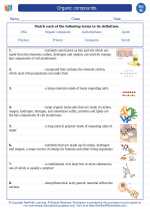 Organic compounds
Organic compounds 

 Worksheet/Answer key
Worksheet/Answer key
 Worksheet/Answer key
Worksheet/Answer key
 Worksheet/Answer key
Worksheet/Answer key
 Vocabulary/Answer key
Vocabulary/Answer key
 Vocabulary/Answer key
Vocabulary/Answer key

The resources above cover the following skills:
Physics: Students will use scientific skills and processes to explain the interactions of matter and energy and the energy transformations that occur.
Thermodynamics: Identify and explain that heat energy is a product of the conversion of one form of energy to another.
Identify and describe the various forms of energy that are transformed in order for systems (living and non-living) to operate: Chemical - Flashlight-Light; Mechanical - Pulleys-Motion; Solar/Radiant - Solar calculator; Chemical - Plant cells.